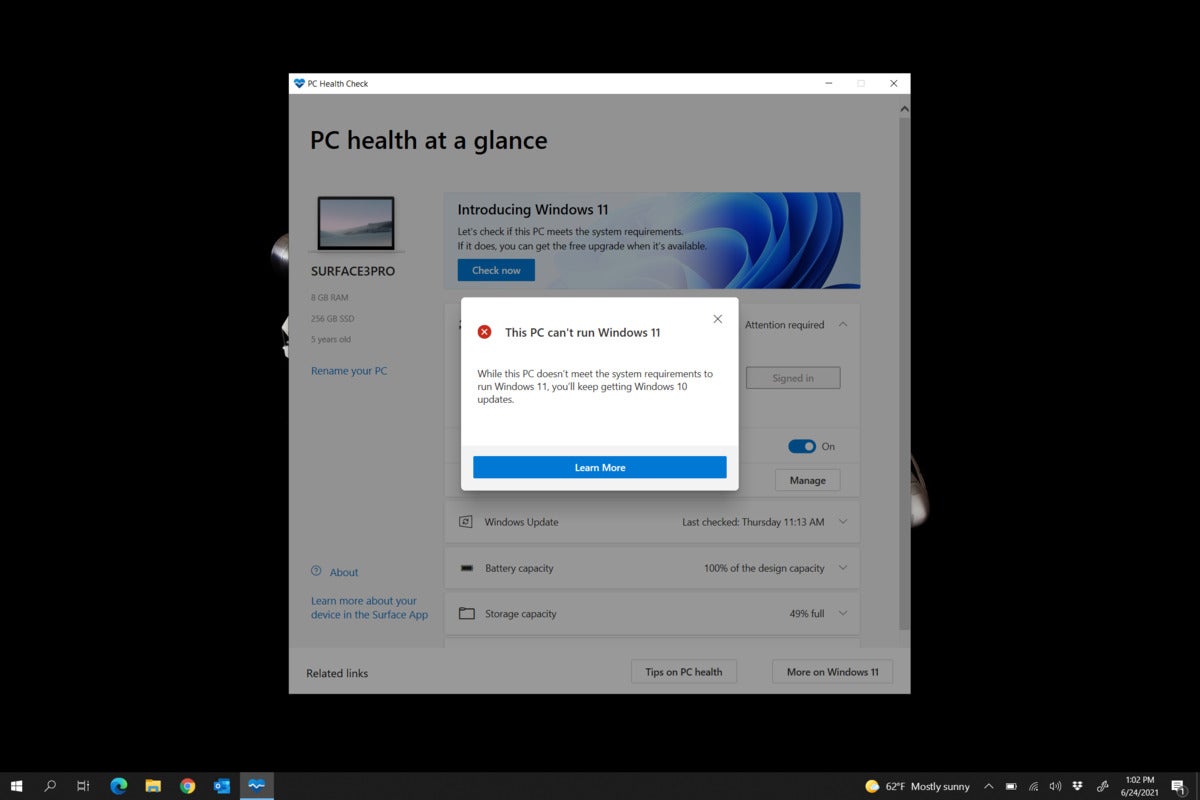Windows 11: Microsoft pulls PC Health Check, eyes broader CPU support
Microsoft made yet another attempt to clarify the hardware requirements surrounding Windows 11 on Monday, in conjunction with the release of the first build of Windows 11. As the company works to sort out initial user confusion, it said it had withdrawn its PC Health Check app that helped determine PC compatibility, and would try to expand its list of supported CPUs.
With much about Windows 11 now known through either a leaked Windows 11 build or the new features announced at Microsoft’s own Windows 11 launch last week, attention has turned to the hardware requirements necessary to run Windows 11. Specifically, many users have wondered why at least an 8th-gen Intel Core CPU and a Trusted Platform Module (TPM) are necessary to run Windows 11, requirements which rule out some PCs from as recent as 2018.
Microsoft tried to explain why a TPM was required to run Windows 11 last week, and on Monday it tried again—this time, to paint a broader picture of how the need for security played into Windows 11. In a blog post authored by “The Windows Team,” Microsoft explained compatibility as defined by the apps you use; the stability of your PC’s operating system; and the need to establish a secure operating system now and into the future.
Microsoft reiterated that the very minimum requirements for Windows 11 to run include a 1GHz, dual-core CPU, 4GB of memory, and 64GB of storage. “Using the principles above, we are confident that devices running on Intel 8th generation processors and AMD Zen 2 as well as Qualcomm 7 and 8 Series will meet our principles around security and reliability and minimum system requirements for Windows 11,” Microsoft said.
The company also suggested that more CPUs than originally specified could potentially be added to the list of Windows 11-compatible chips. “As we release to Windows Insiders and partner with our OEMs, we will test to identify devices running on Intel 7th generation and AMD Zen 1 that may meet our principles,” the blog post continued.
Specifically, Microsoft said, it was testing to ensure that these processors could support a secure, stable, and reliable OS experience. Microsoft said that it was committed to supporting CPUs that had adopted its Windows driver model, as well as support chip vendors who could provide a “99.8 percent crash-free experience.”
At Microsoft, security is now as important as anything else
What the blog post also attempted to communicate was something that Microsoft seems to assume all users recognize: that security is now as important a requirement as CPU speed, memory, or storage.
“Windows 11 raises the bar for security by requiring hardware that can enable protections like Windows Hello, Device Encryption, virtualization-based security (VBS), hypervisor-protected code integrity (HVCI) and Secure Boot,” Microsoft wrote. “The combination of these features has been shown to reduce malware by 60% on tested devices. To meet the principle, all Windows 11 supported CPUs have an embedded TPM, support secure boot, and support VBS [Virtualization-Based Security] and specific VBS capabilities.”
The priority Microsoft now gives security is one that the company actually began communicating back in 2017, when it warned that Microsoft may cut off PCs using older CPUs from using Windows 10.
Unfortunately, however, Microsoft never really drove that point home when explaining Windows 11’s requirements, and it did so somewhat in passing again on Monday. “We need a minimum system requirement that enables us to adapt software and hardware to keep pace with people’s expectations, needs and harness the true value and power of the PC to deliver the best experiences, now and in the future,” Microsoft said.
The message is becoming clearer: To future-proof your PC, Microsoft is now requiring it to maintain a minimum level of security.
Bye-bye, PC Health Check
Along with publishing a detailed list of hardware requirements for Windows 11, Microsoft had offered an approved PC Health Check application to allow users to determine whether ther PC would satisfy the requirements. Unfortunately the initial version of the Health Check app offered little more than a passing or failing grade, with no explanation. A subsequent revision offered more detail, but apparently not enough.
On Monday, Microsoft said it was pulling PC Health Check, with the intent to bring it back by the fall, when Windows would be more generally available. (Microsoft said late Friday, however, that Windows 10-to-Windows 11 upgrades would not begin until 2022.)
“With these minimum system requirements in mind, the PC Health Check app was intended to help people check if their current Windows 10 PC could upgrade to Windows 11,” Microsoft said. “Based on the feedback so far, we acknowledge that it was not fully prepared to share the level of detail or accuracy you expected from us on why a Windows 10 PC doesn’t meet upgrade requirements. We are temporarily removing the app so that our teams can address the feedback.”
For all the latest Technology News Click Here
For the latest news and updates, follow us on Google News.

